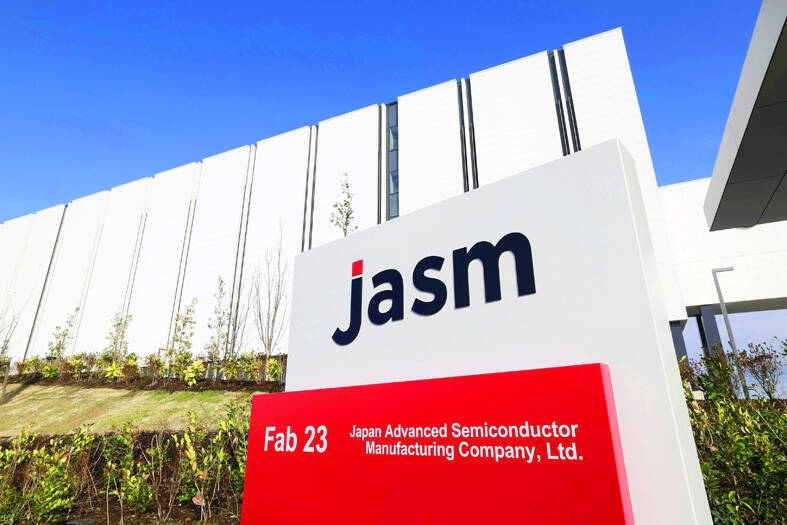Taiwan Semiconductor Manufacturing Co (TSMC, 台積電), the world’s largest contract chipmaker, received NT$47.55 billion (US$1.51 billion) in subsidies from China and Japan last year for investing in those countries, company data showed.
The subsidies were sharply higher than in 2022, when they totaled about NT$7.5 billion, reflecting that many countries covet TSMC’s technology and are eager to attract the firm.
The subsidies last year were handed out to support the expansion or building of new facilities in Nanjing, China, and Kumamoto, Japan. They were also used to finance land and equipment purchases, and to fund day-to-day operations.

Photo: Kyodo News via AP
TSMC opened a plant in Kumamoto on Feb. 24 through its joint venture Japan Advanced Semiconductor Manufacturing (JASM). The firm is planning to build a second fab in Kumamoto, with construction slated to begin at the end of next year and mass production scheduled to begin at the end of 2027.
The firm is to invest more than US$20 billion in the projects in Japan, TSMC said, adding that it has received strong support from the Japanese government.
On Feb. 24, Japanese Minister of Economy, Trade and Industry Ken Saito said that the Japanese government would grant ¥732 billion (US$4.98 billion) to JASM to build the second fab in Kumamoto.
Along with a subsidy of ¥476 billion for the first fab in Kumamoto, the Japanese government’s total grants to TSMC would top ¥1.2 trillion.
Elsewhere, TSMC is investing US$40 billion to build two advanced wafer plants in Arizona.
A report from Bloomberg on Friday cited sources as saying that TSMC is set to secure more than US$5 billion in federal grants to support its investments in Arizona, much lower than the subsidies planned by Japan.
The report said the grants have not been finalized, and it was still unclear whether the Taiwanese chipmaker would tap into the loans and guarantees on offer from the CHIPS and Science Act that US President Joe Biden signed into law in August 2022.
TSMC did not comment on the report.
Several chipmakers, including TSMC, Intel Corp, Samsung Electronics Co and Micron Technology Inc, are in discussions with the US government for about US$28 billion in subsidies for sophisticated facility investments through the CHIPS Act, Bloomberg reported.
US officials were aiming to announce grants to major chipmakers by the end of this month, the report said.
The US government has so far unveiled three grants to companies that roll out older generation semiconductors.
TSMC is also planning to build a wafer fab in Germany. Recent reports said TSMC could receive up to 5 billion euros (US$5.47 billion) in grants from the German government for the new plant, almost half of the total investment.

Intel Corp chief executive officer Lip-Bu Tan (陳立武) is expected to meet with Taiwanese suppliers next month in conjunction with the opening of the Computex Taipei trade show, supply chain sources said on Monday. The visit, the first for Tan to Taiwan since assuming his new post last month, would be aimed at enhancing Intel’s ties with suppliers in Taiwan as he attempts to help turn around the struggling US chipmaker, the sources said. Tan is to hold a banquet to celebrate Intel’s 40-year presence in Taiwan before Computex opens on May 20 and invite dozens of Taiwanese suppliers to exchange views

Application-specific integrated circuit designer Faraday Technology Corp (智原) yesterday said that although revenue this quarter would decline 30 percent from last quarter, it retained its full-year forecast of revenue growth of 100 percent. The company attributed the quarterly drop to a slowdown in customers’ production of chips using Faraday’s advanced packaging technology. The company is still confident about its revenue growth this year, given its strong “design-win” — or the projects it won to help customers design their chips, Faraday president Steve Wang (王國雍) told an online earnings conference. “The design-win this year is better than we expected. We believe we will win

Chizuko Kimura has become the first female sushi chef in the world to win a Michelin star, fulfilling a promise she made to her dying husband to continue his legacy. The 54-year-old Japanese chef regained the Michelin star her late husband, Shunei Kimura, won three years ago for their Sushi Shunei restaurant in Paris. For Shunei Kimura, the star was a dream come true. However, the joy was short-lived. He died from cancer just three months later in June 2022. He was 65. The following year, the restaurant in the heart of Montmartre lost its star rating. Chizuko Kimura insisted that the new star is still down

While China’s leaders use their economic and political might to fight US President Donald Trump’s trade war “to the end,” its army of social media soldiers are embarking on a more humorous campaign online. Trump’s tariff blitz has seen Washington and Beijing impose eye-watering duties on imports from the other, fanning a standoff between the economic superpowers that has sparked global recession fears and sent markets into a tailspin. Trump says his policy is a response to years of being “ripped off” by other countries and aims to bring manufacturing to the US, forcing companies to employ US workers. However, China’s online warriors